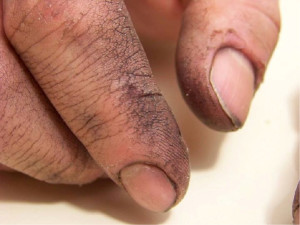Washing the Hands of Your Father
Axiom and Challenge in Family Businesses
In discussions about successful multi-generational family businesses I frequently state what I believe to be an axiom: “each generation needs to respect the past and keep an eye on the future.” Challenges, often expressed, to achieving this ideal are a loss of perspective, and even worse, a sense of entitlement in our children–a result of giving them what we ourselves did not have–wanting them to have a better life than we did.
This is touchingly illustrated in a post (now removed) from This Blew My Mind http://www.thisblewmymind.com, shared by friend Joseph Meerbaum on his Linkedin page on June 21, 2015.
 A young man went to seek an important position at a large printing company. He passed the initial interview and was going to meet the director for the final interview. The director saw his resume; it was excellent. And asked, “Have you received a scholarship for school?”
A young man went to seek an important position at a large printing company. He passed the initial interview and was going to meet the director for the final interview. The director saw his resume; it was excellent. And asked, “Have you received a scholarship for school?”
The boy replied, “No.” “It was your father who paid for your studies?” “Yes.” He replied. “Where does your father work?” “My father is a Blacksmith.” The Director asked the young man to show him his hands. The young man showed a pair of hands soft and perfect.
“Have you ever helped your parents at their job?” “Never, my parents always wanted me to study and read more books. Besides, he can do the job better than me.” The director said, “I have got a request. When you go home today, go and wash the hands of your father and then come see me tomorrow morning.”
The young man felt his chance to get the job was high. When he returned to his house he asked his father if he would allow him to wash their hands.
His father felt strange, happy, but with mixed feelings and showed their hands to his son. The young man washed his hands, little by little. It was the first time that he noticed his father’s hands were wrinkled and they had so many scars. Some bruises were so painful that his skin shuddered when he touched them.
This was the first time that the young man recognized what it meant for this pair of hands to work every day to be able to pay for his study. The bruises on the hands were the price that he paid for their education, his school activities and his future.
After cleaning his father’s hands the young man stood in silence and began to tidy and clean up the workshop. That night, father and son talked for a long time.
The next morning, the young man went to the office of the director.
The Director noticed the tears in the eyes of the young man when He asked him, “Can you tell me what you did and what you learned yesterday at your house?”
The boy replied, “I washed my father’s hands and when I finished I stayed and cleaned his workshop.”
Now I know what it is to appreciate and recognize that without my parents, I would not be who I am today. By helping my father I now realize how difficult and hard it is to do something on my own. I have come to appreciate the importance and the value in helping the family.
The director said, “This is what I look for in my people. I want to hire someone who can appreciate the help of others, a person who knows the hardship of others to do things, and a person who does not put money as his only goal in life”. “You are hired.”
A child that has been coddled, Protected and usually given him what he wants, develops a mentality of ” I have the right ‘ and will always put himself first, ignoring the efforts of their parents. If we are this type of protective parent are we really showing love or are we destroying our children?
You can give your child a big house, good food, computer classes, watch on a big screen TV. But when you’re washing the floor or painting a wall, please let him experience that too.
After eating have them wash the dishes with their brothers and sisters. It is not because you have no money to hire someone to do this it’s because you want to love them the right way. No matter how rich you are, you want them to understand. One day your hair will have gray hair, like the father of this young man.
The most important thing is that your child learns to appreciate the effort and to experience the difficulties and learn the ability to work with others to get things done.
